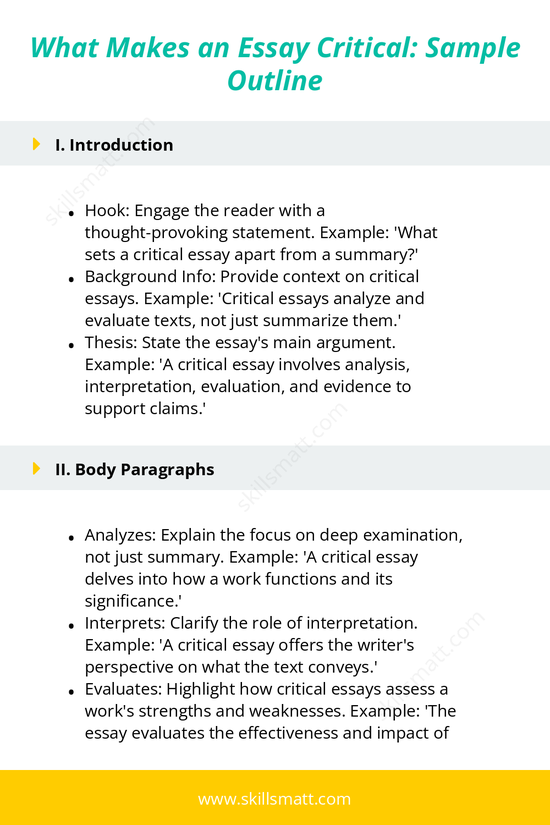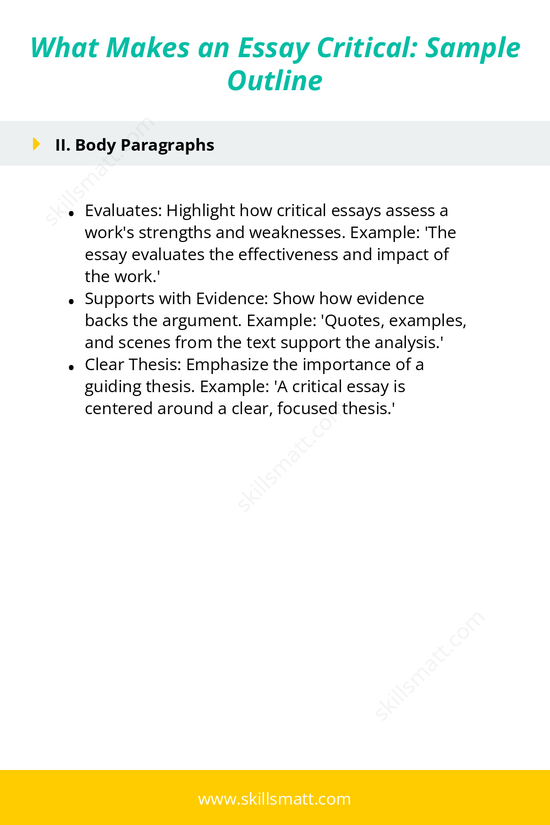What Makes an Essay Critical: Sample Outline
I. Introduction
- Hook: Engage the reader with a thought-provoking statement. Example: 'What sets a critical essay apart from a summary?' This question instantly invites curiosity and makes the reader eager to understand the differences.
- Background Info: Provide context on critical essays. Example: 'Critical essays analyze and evaluate texts, not just summarize them.' Clarifying the nature of critical essays gives the reader an understanding of their role in academic writing.
- Thesis: State the essay’s main argument. Example: 'A critical essay involves analysis, interpretation, evaluation, and evidence to support claims.' The thesis guides the entire essay and indicates the depth of examination the reader can expect.
II. Body Paragraphs
- Analyzes: Explain the focus on deep examination, not just summary. Example: 'A critical essay delves into how a work functions and its significance.' Emphasize that critical essays go beyond recounting plot points to explore the deeper meaning.
- Interprets: Clarify the role of interpretation. Example: 'A critical essay offers the writer’s perspective on what the text conveys.' It's important to explain how critical essays provide subjective insights into a work, grounded in analysis.
- Evaluates: Highlight how critical essays assess a work’s strengths and weaknesses. Example: 'The essay evaluates the effectiveness and impact of the work.' Evaluation goes beyond personal opinion to a reasoned judgment based on evidence.
- Supports with Evidence: Show how evidence backs the argument. Example: 'Quotes, examples, and scenes from the text support the analysis.' Evidence is the backbone of a critical essay, substantiating the argument with concrete examples.
- Clear Thesis: Emphasize the importance of a guiding thesis. Example: 'A critical essay is centered around a clear, focused thesis.' Every paragraph should relate back to the thesis, keeping the essay cohesive and focused.
III. Conclusion
- Restate Thesis: Summarize key points. Example: 'A critical essay goes beyond summary, offering deep analysis and evaluation.' Restating the thesis reminds the reader of the main focus and reinforces the purpose of the essay.
- Closing Thoughts: Offer final insights. Example: 'A well-crafted critical essay provides deeper understanding of a text.' The conclusion should leave the reader with a strong sense of the essay’s contribution to their understanding of the work being analyzed.


